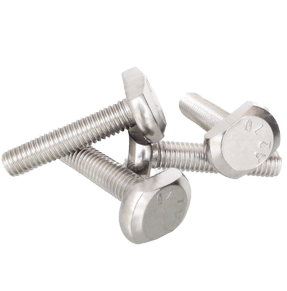

shear bolts
Nov . 19, 2024 23:32 Back to list
shear bolts
Understanding Shear Bolts Application, Design, and Benefits
Shear bolts, also known as shear pins, are specialized fasteners designed to fail at a predetermined load. This failure mode is intentional and serves essential safety and operational purposes in various applications. In this article, we will explore the characteristics, design considerations, applications, and advantages of shear bolts, illustrating their critical role in mechanical systems.
What are Shear Bolts?
Shear bolts are fasteners engineered to break under specific shear stress loads. Typically made from materials such as steel or other alloys, they are designed to connect two or more components while also providing a fail-safe mechanism. When subjected to excessive force or unexpected conditions, shear bolts will fail before any critical components can be damaged, protecting machinery and users alike.
Design and Characteristics
The design of shear bolts involves several key parameters. First, the shear strength of the bolt must be determined, which is influenced by the material properties and the bolt's diameter and length. Engineers often use established formulas to calculate the maximum shear load the bolt can withstand, ensuring that the component is tailored to the application's specific requirements.
Another crucial consideration is the installation of shear bolts. These bolts are usually fitted with a head that can be designed to shear off when the specified load is exceeded. Proper installation practices are essential; if the bolts are overtightened or if dirt or grease interfere with their function, they may fail under conditions they're intended to support.
Applications of Shear Bolts
shear bolts

Shear bolts are used across a wide range of industries and applications. One of the most common uses is in machinery and equipment protection. For instance, in agricultural machinery, shear bolts are employed in devices like rotary cutters and grain augers, where they act as a link to prevent damage during jams or overload conditions. When an obstruction occurs, the shear bolt breaks, allowing the machine to stop without incurring serious harm.
Another prominent application is in automotive engineering. Shear bolts are often utilized in safety mechanisms, such as in airbag systems, where they can serve as a decisive link that activates during a collision. Similarly, in construction and fabrication, shear bolts may be installed in structural elements to improve safety and reliability, allowing components to flex and absorb shocks without transmitting loads to more critical structures.
Advantages of Shear Bolts
The primary advantage of shear bolts is their protective functionality. By failing at a predetermined load, they prevent further damage to machinery and reduce the risk of injury to operators. This safety feature is especially vital in high-risk environments, where equipment failure can lead to catastrophic consequences.
Moreover, shear bolts offer easy replacement and maintenance. Since they are designed to fail, replacing a shear bolt after an incident is typically a simple process, often requiring minimal downtime. This ease of maintenance is invaluable in industries where time and efficiency are critical.
Additionally, the cost-effectiveness of shear bolts cannot be overlooked. While there may be initial design and engineering costs, the long-term savings from avoiding extensive repairs and operational downtime often compensate for these expenses.
Conclusion
In conclusion, shear bolts play a vital role in ensuring the safety and functionality of various mechanical systems. Their ability to fail under predetermined conditions protects both equipment and operators, making them an essential component in numerous applications ranging from agriculture to automotive safety. With their straightforward design, ease of maintenance, and cost-effectiveness, shear bolts remain a pivotal choice in engineering solutions. As technology advances, the development of even more efficient and reliable shear pins will only enhance the safety and performance of mechanical systems in the future.
Latest news
-
High-Strength Hot Dip Galvanized Bolts - Hebei Longze | Corrosion Resistance, Customization
NewsJul.30,2025
-
Hot Dip Galvanized Bolts-Hebei Longze|Corrosion Resistance&High Strength
NewsJul.30,2025
-
High-Strength Hot-Dip Galvanized Bolts-Hebei Longze|Corrosion Resistance&High Strength
NewsJul.30,2025
-
Hot Dip Galvanized Bolts-Hebei Longze|Corrosion Resistance&High Strength
NewsJul.30,2025
-
Hot Dip Galvanized Bolts - Hebei Longze | Corrosion Resistance, High Strength
NewsJul.30,2025
-
High-Strength Hot Dip Galvanized Bolts-Hebei Longze|Corrosion Resistance, Grade 8.8
NewsJul.30,2025

